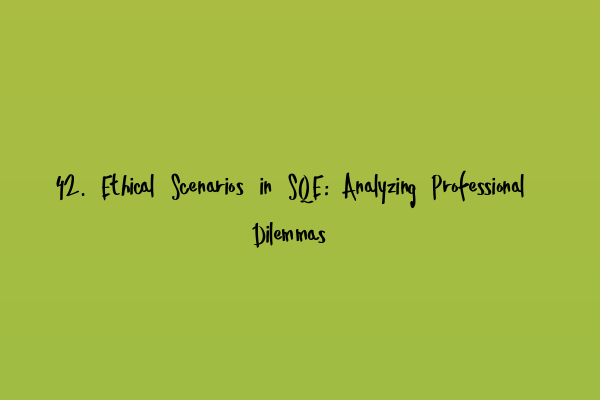Welcome to SQE Exam Law, where we believe that ethics and professional conduct are crucial in the legal profession. In today’s blog post, we will dive into the fascinating topic of ethical scenarios in the SQE exam, specifically analyzing professional dilemmas that aspiring solicitors may encounter. Whether you are preparing for the SQE 1 or SQE 2 exam, understanding and mastering these ethical scenarios is essential for success.
Understanding the Importance of Ethics in the SQE Exam
Before we delve into the various ethical scenarios, let us first emphasize the significance of ethics in the SQE exam. The Solicitors Qualifying Exam (SQE) aims to assess the competence and professionalism of individuals seeking qualification as solicitors in England and Wales. It is imperative to demonstrate a deep understanding of ethical principles and their application in real-world situations.
Competence is undoubtedly crucial, but it is equally important to embody integrity, honesty, and ethical decision-making in the legal profession. Solicitors are entrusted with sensitive information and play a fundamental role in ensuring justice. Ethical dilemmas often arise, and solicitors must navigate complex situations while upholding their professional obligations.
Analyzing Professional Dilemmas in the SQE Exam
Now, let’s explore some common ethical scenarios that you may encounter during the SQE exam. Familiarizing yourself with these scenarios will help you develop the necessary skills to navigate them effectively:
- Confidentiality: You receive confidential information from a client but later discover that your colleague, who is representing the opposing party, is unaware of this crucial detail. How do you handle this situation while maintaining client confidentiality and adhering to your duty of disclosure?
- Conflict of Interest: You work for a law firm that represents both the plaintiff and the defendant in a high-profile case. How do you manage the conflict of interest while ensuring fairness to all parties involved?
- Client Engagement: Your client insists on pursuing a course of action that you believe is legally unsound. How do you balance your duty to advocate for your client’s interests while maintaining your ethical obligation to advise against pursuing an action that may not be in their best interests?
- Multiculturalism and Diversity: You are assigned to a case that involves a client from a different cultural background, and their values and practices may conflict with your personal beliefs. How do you navigate this situation while respecting cultural differences and maintaining professionalism?
These are just a few examples of the ethical scenarios that may be presented in the SQE exam. It is crucial to approach each scenario with careful consideration, applying the relevant ethical codes and principles to determine the most appropriate course of action.
Preparing for Ethical Scenarios in the SQE Exam
While the scenarios in the SQE exam may be challenging, proper preparation can significantly enhance your ability to tackle them effectively. Here are some tips to help you prepare for ethical scenarios:
- Study the SRA Code of Conduct: Familiarize yourself with the Solicitors Regulation Authority (SRA) Code of Conduct, as it outlines the ethical standards expected from solicitors. Understand the principles and apply them to various scenarios.
- Practice with Ethical Scenarios: Engage in practice exam questions and mock tests that include ethical scenarios. This will help you develop the analytical and decision-making skills necessary to tackle such situations effectively. SQE 1 Practice Exam Questions and SQE 1 Practice Mocks FLK1 FLK2 provided by SQE Exam Law can be invaluable resources for honing your skills.
- Seek Guidance and Feedback: Discuss ethical scenarios with experienced solicitors or tutors who can provide guidance and feedback on your approach. Their insights can help you refine your decision-making process and gain a deeper understanding of ethical considerations.
- Enroll in Preparation Courses: Consider enrolling in SQE 1 and SQE 2 preparation courses. These courses not only cover substantive legal knowledge but also focus on ethics and professional conduct. SQE Exam Law offers comprehensive SQE 2 preparation courses and SQE 1 preparation courses to help you excel in all aspects of the exam.
By investing time and effort into preparing for ethical scenarios, you will strengthen your ability to make sound decisions while upholding the ethical standards expected of solicitors.
Conclusion
As a future solicitor, understanding and navigating ethical scenarios is essential for success in the SQE exam and beyond. Remember, the solicitor’s role goes beyond legal competence. Upholding professionalism, integrity, and ethical conduct are paramount in the legal profession.
If you are preparing for the SQE exam, SQE Exam Law is here to support you. Check out our range of preparation courses and resources designed to help you succeed. Remember, the SQE exam is not just about legal knowledge; it’s about demonstrating your ability to make ethical and professional decisions. By mastering ethical scenarios, you will be well on your way to becoming a competent and respected solicitor.
For more information on the SQE exam and important dates, please visit the SRA SQE Exam Dates page.
